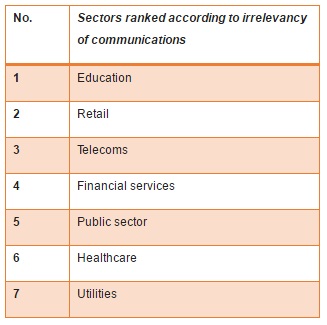The majority of branded communications issued by companies has been branded as ‘irrelevant’ by consumers, with schools and retailers among the worst at spamming customers, according to new research.
The study, commissioned by global IT services company Ricoh, and carried out in the UK and Ireland by Coleman Parkes, identified consumer sentiment across seven different industries including education, healthcare and telecoms.
Key findings of the research include:
– 81% of respondents said that the material sent to them by educational establishments – schools, colleges and universities – was irrelevant to them
– Retail was the industry rated as the least trustworthy to keep consumer data safe, with 72% saying they don’t trust store brands
– Nearly a third (32%) of respondents have taken their custom elsewhere after being spammed by irrelevant material from brands and service providers
– 52% and 47% of respondents have more faith in the healthcare and wider public sector respectively to keep their data safe than they do in the education, retail, telecoms, financial services and utilities sectors
The research quizzed consumers across the UK and Ireland about the communications material they received from brands and service providers. The majority of respondents (81 per cent) said the material sent to them by educational establishments – such as schools, colleges and universities – was irrelevant to them, while 83 per cent said the same about content from retailers.
Researchers polled respondents from seven different industries about the communications sent by their organisations. The best performing, according to the survey, are utilities and healthcare organisations, with 46 per cent and 42 per cent of respondents respectively saying these sectors’ communications are normally relevant to them. However, this is hardly a shining indictment of strong performance, with no sector’s communications rated as relevant by the majority of consumers.
Alongside this issue of general and non-personalised communications, consumers have also revealed they no longer trust businesses to handle and secure their personal data. Retail was the industry rated as least trustworthy, with nearly three-quarters of consumers (72 per cent) saying they don’t trust store brands. Consumers appear to have more faith in the healthcare and wider public sector to keep their data safe, with 52 percent and 47 percent giving them their backing. Perhaps not coincidentally, these are also sectors with more rigorous regulations about how customer information is handled and used.
Significantly, the junk mail problem has a real impact on business’ bottom-lines. Nearly one-third of consumers (32 per cent) say they have taken their custom elsewhere after being spammed by irrelevant material from brands and service providers. Furthermore, 68 per cent of consumers have admitted they would spend less with the offending businesses.
Chas Moloney, Marketing Director, Ricoh UK and Ireland, said: “Consumers are contacted several times a day by brands and this relentless communication can become overwhelming. It’s getting to the stage whereby this poorly targeted material is affecting business performance – eroding levels of trust, alienating potential customers and wasting valuable budget on paper and printing.
“This lack of focus also has wider implications on the environment, with our ever-decreasing forestry bearing the brunt of this seemingly scattergun approach. Only with a laser-sharp focus, and by putting the customer at the heart of all communications strategies, can brands reap the rewards of building customer relationships.”
Source: www.ricoh.co.uk

